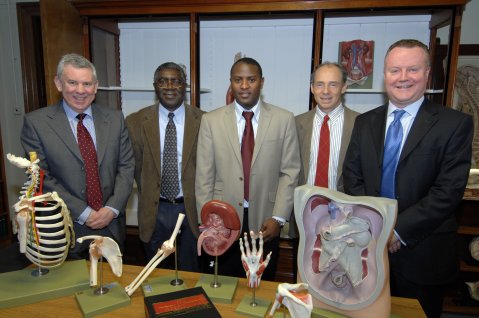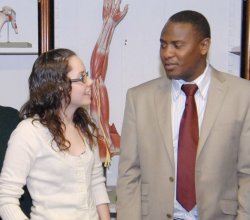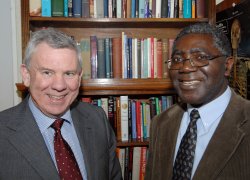Bringing Africa to St Andrews

Medical students in one of the poorest countries in Africa will soon be in touch with their counterparts in Scotland, thanks to a new initiative launched jointly by the University of St Andrews and the University of Malawi.
The University has set up a `buddy-friendship’ system between students in both countries – utilising a blog and email contacts between students at the College of Medicine in Blantyre, Malawi and the Bute Medical School in St Andrews.
The scheme is being launched this week while a delegation of senior staff from Malawi visit St Andrews on a fact-finding mission. The visitors from the College of Medicine in Blantyre – Malawi’s only medical school – are particularly interested in the way the Bute Medical School has developed its curriculum in recent years, especially its use of IT in delivering material to students.
With a population of around 15 m and a current capacity to train only 60 doctors per year, Malawi is facing one of the greatest healthcare challenges in Africa. As part of the country’s Emergency Human Resource Programme, Malawi wishes to greatly increase its professional healthcare training, including medical student numbers. The need to increase capacity for medical student training in Malawi may be helped by the recent developments in St Andrews where a new curriculum dealing with a large increase in students numbers has been introduced.
 Due to the expense and difficulty in obtaining teaching material within Malawi, students at St Andrews will be able to use the new system to send medical texts and learning materials which might not be available to students in Malawi. The buddy system will allow St Andrews and Malawian medical students to be able to help each other with their respective studies bringing their own perspectives to this interaction. It is hoped that the initiative will benefit both sets of students facing very different medical realities, eventually leading to more permanent links in teaching and research.
Due to the expense and difficulty in obtaining teaching material within Malawi, students at St Andrews will be able to use the new system to send medical texts and learning materials which might not be available to students in Malawi. The buddy system will allow St Andrews and Malawian medical students to be able to help each other with their respective studies bringing their own perspectives to this interaction. It is hoped that the initiative will benefit both sets of students facing very different medical realities, eventually leading to more permanent links in teaching and research.
In March last year, St Andrews officials travelled to Malawi to visit the medical school and Ministry of Health officials to discuss scope for working together.
Professor Simon Guild, Director of Teaching at the Bute, said, “At the time of our initial visit, we had just introduced our own new curriculum, with an emphasis on self-directed online learning, which the Malawians were interested in. But while we take internet access and hi-speed communications for granted, Malawians have much more limited access because of the expense of providing adequate bandwidth and speed through commercial satellite access.
“The purpose of this current visit is to let them see how we teach and how we use IT as a means to deliver the curriculum and communicate with students. We can give them advice on the software and hardware that they will need to replicate the virtual learning environment we have built here and how to establish their own intranet.
“Obviously both groups of students have a lot to learn from each other. We have many students keen to go over to Malawi to learn more about diseases such as HIV, malaria and TB, while we can teach Malawian students more about cancer, diabetes and even stress. The idea of the online buddy system is so that students can make friends through both academic and social interests, so that they can get to know each other before perhaps meeting in person.”
 The connection between St Andrews and Malawi goes back decades. Before the establishment of the College of Medicine in Malawi medical students came to Scotland to study. As a result many of Malawi’s doctors are St Andrews’ graduates, many of them holding senior positions at Blantyre and retaining fond memories of Scotland.
The connection between St Andrews and Malawi goes back decades. Before the establishment of the College of Medicine in Malawi medical students came to Scotland to study. As a result many of Malawi’s doctors are St Andrews’ graduates, many of them holding senior positions at Blantyre and retaining fond memories of Scotland.
But it’s not all about St Andrews – the University hopes to work together with other institutions across the country, taking on a Scottish-wide approach to coordinate the input of medical specialisms into the training of healthcare professionals in Malawi.
“It’s all about providing Malawi with joined up, coordinated help in healthcare professional training,” Professor Guild continued. “We could do a lot together in a very short space of time utlising Scotland’s many areas of specialism. Medical students and junior doctors can come to Scotland from Malawi to train in specialist areas before taking that knowledge and practical experience back with them. Of course, many students leave Africa after graduating, but we hope that by building capacity over there, more will stay.”
The University hopes to visit Malawi again next month to finalise the way forward, but the launch of the buddy system is the first step in cementing relationships between students in St Andrews and Malawi.
Professor Guild continued, “It doesn’t take much to help – even small things such as sending over spare copies of books from our library can make a big difference. We can help with all educational aspects of Malawian medical students, but we can learn from each other in a lot of respects too. We hope that our new buddy system will be of enormous benefit to both sets of students.”
ENDS
Issued by the Press Office, University of St Andrews
Contact Gayle Cook, Press Officer on 01334 467227 / 462529, mobile 07900 050 103, or email [email protected]
Ref: Africa 120208
View the latest University press releases at www.st-andrews.ac.uk
Category Student experience